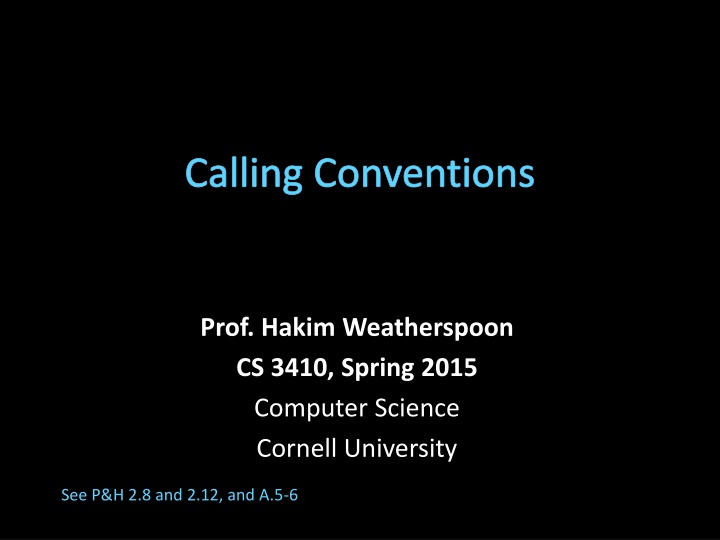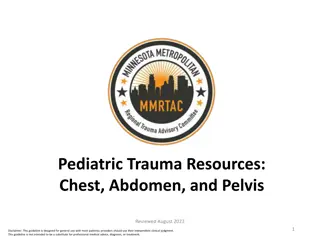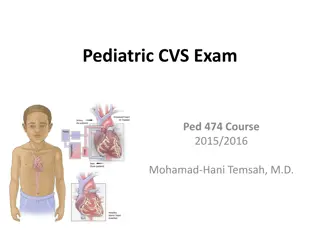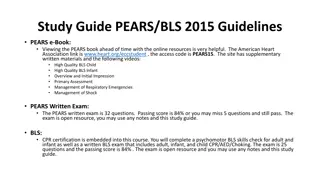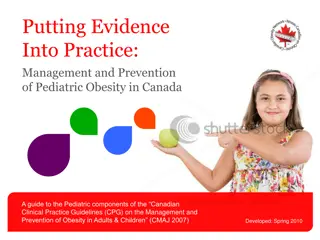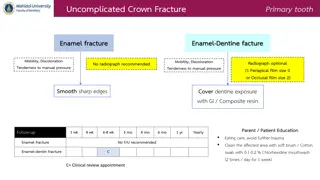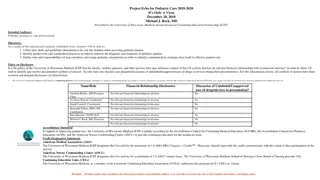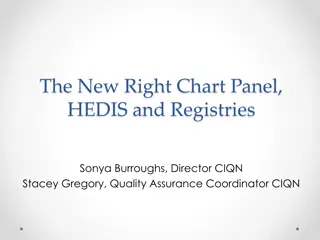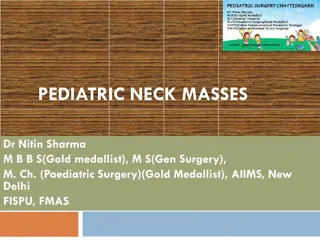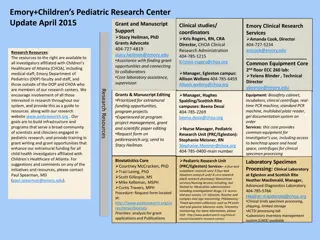Pediatric Undernutrition
Pediatric undernutrition is the result of inadequate food supply, poor access to health, chronic conditions, or inappropriate feeding practices. Protein-energy malnutrition (PEM) is a spectrum of conditions caused by protein and calorie deficiencies. Failure to Thrive refers to children failing to gain weight appropriately. Marasmus is a condition resulting from inadequate calories and nutrients, leading to muscle and fat loss.
Download Presentation

Please find below an Image/Link to download the presentation.
The content on the website is provided AS IS for your information and personal use only. It may not be sold, licensed, or shared on other websites without obtaining consent from the author.If you encounter any issues during the download, it is possible that the publisher has removed the file from their server.
You are allowed to download the files provided on this website for personal or commercial use, subject to the condition that they are used lawfully. All files are the property of their respective owners.
The content on the website is provided AS IS for your information and personal use only. It may not be sold, licensed, or shared on other websites without obtaining consent from the author.
E N D
Presentation Transcript
Calling Conventions Prof. Hakim Weatherspoon CS 3410, Spring 2015 Computer Science Cornell University See P&H 2.8 and 2.12, and A.5-6
Announcement Upcoming agenda PA1 due yesterday PA2 available and discussed during lab section this week PA2 Work-in-Progress due Monday, March 16th PA2 due Thursday, March 26th HW2 available next week, due before Prelim2 in April Spring break: Saturday, March 28th to Sunday, April 5th
Goals for Today Review: Calling Conventions call a routine (i.e. transfer control to procedure) pass arguments fixed length, variable length, recursively return to the caller Putting results in a place where caller can find them Manage register Today More on Calling Conventions globals vs local accessible data callee vs caller saved registers Calling Convention examples and debugging
Goals for Today Review: Calling Conventions call a routine (i.e. transfer control to procedure) pass arguments fixed length, variable length, recursively return to the caller Putting results in a place where caller can find them Manage register Today More on Calling Conventions globals vs local accessible data callee vs caller saved registers Calling Convention examples and debugging Warning: There is no one true MIPS calling convention. lecture != book != gcc != spim != web
MIPS Register Recap Return address: $31 (ra) Stack pointer: $29 (sp) Frame pointer: $30 (fp) First four arguments: $4-$7 (a0-a3) Return result: $2-$3 (v0-v1) Callee-save free regs: $16-$23 (s0-s7) Caller-save free regs: $8-$15,$24,$25 (t0-t9) Reserved: $26, $27 (k0-k1) Global pointer: $28 (gp) Assembler temporary: $1 (at)
MIPS Register Conventions zero assembler temp r17 r18 r19 r20 r21 r22 r23 r24 r25 r26 r27 r28 r29 r30 r31 r0 $zero r1 r2 r3 r4 r5 r6 r7 r8 r9 r10 $t2 r11 $t3 r12 $t4 r13 $t5 r14 $t6 r15 $t7 r16 $s0 $s1 $s2 $s3 $s4 $s5 $s6 $s7 $t8 $t9 $k0 $k1 $gp $sp $fp $ra $at $v0 $v1 $a0 $a1 $a2 $a3 $t0 $t1 function return values saved (callee save) function arguments more temps (caller save) reserved for kernel global data pointer stack pointer frame pointer return address temps (caller save)
Recap: Conventions so far first four arg words passed in $a0, $a1, $a2, $a3 remaining arg words passed in parent s stack frame return value (if any) in $v0, $v1 stack frame at $sp contains $ra (clobbered on JAL to sub-functions) contains $fp contains local vars (possibly clobbered by sub-functions) contains extra arguments to sub-functions (i.e. argument spilling ) contains space for first 4 arguments to sub-functions callee save regs are preserved caller save regs are not preserved Global data accessed via $gp Bottom of current stack frame $fp saved ra saved fp saved regs ($s0 ... $s7) locals Top of the stack outgoing args $sp
Globals and Locals Global variables in data segment Exist for all time, accessible to all routines Dynamic variables in heap segment Exist between malloc() and free() Local variables in stack frame Exist solely for the duration of the stack frame Dangling pointers into freed heap mem are bad Dangling pointers into old stack frames are bad C lets you create these, Java does not E.g. int *foo() { int a; return &a; }
Anatomy of an executing program 0xfffffffc top system reserved 0x80000000 0x7ffffffc stack dynamic data (heap) 0x10000000 .data static data PC code (text) 0x00400000 .text 0x00000000 bottom system reserved
MIPS Register Recap Return address: $31 (ra) Stack pointer: $29 (sp) Frame pointer: $30 (fp) First four arguments: $4-$7 (a0-a3) Return result: $2-$3 (v0-v1) Callee-save free regs: $16-$23 (s0-s7) Caller-save free regs: $8-$15,$24,$25 (t0-t9) Reserved: $26, $27 Global pointer: $28 (gp) Assembler temporary: $1 (at)
Caller-saved vs. Callee-saved Callee-save register: Assumes register not changed across procedure call Thus, callee must save the previous contents of the register on procedure entry, restore just before procedure return E.g. $ra, $fp, $s0-s7 Caller-save register: Assumes that a caller can clobber contents of register Thus, caller must save the previous contents of the register before proc call Caller, then, restores after the call to subroutine returns E.g. $a0-a3, $v0-$v1, $t0-$t9 MIPS calling convention supports both
Caller-saved vs. Callee-saved Callee-save register: Assumes register not changed across procedure call Thus, callee must save the previous contents of the register on procedure entry, restore just before procedure return E.g. $ra, $fp, $s0-s7, $gp Also, $sp Caller-save register: Assumes that a caller can clobber contents of register Thus, caller must save the previous contents of the register before proc call Caller, then, restores after the call to subroutine returns E.g. $a0-a3, $v0-$v1, $t0-$t9 MIPS calling convention supports both
Caller-saved vs. Callee-saved Caller-save: If necessary ($t0 .. $t9) save before calling anything; restore after it returns Callee-save: Always ($s0 .. $s7) save before modifying; restore before returning Caller-save registers are responsibility of the caller Caller-save register values saved only if used after call/return The callee function can use caller-saved registers Callee-save register are the responsibility of the callee Values must be saved by callee before they can be used Caller can assume that these registers will be restored Save if want to use after a call Save before use
Caller-saved vs. Callee-saved Caller-save: If necessary ($t0 .. $t9) save before calling anything; restore after it returns Callee-save: Always ($s0 .. $s7) save before modifying; restore before returning MIPS ($t0-$t9), x86 (eax, ecx, and edx) are caller-save a function can freely modify these registers but must assume that their contents have been destroyed if it in turns calls a function. MIPS ($s0 - $s7), x86 (ebx, esi, edi, ebp, esp) are callee-save A function may call another function and know that the callee-save registers have not been modified However, if it modifies these registers itself, it must restore them to their original values before returning.
Caller-saved vs. Callee-saved Caller-save: If necessary ($t0 .. $t9) save before calling anything; restore after it returns Callee-save: Always ($s0 .. $s7) save before modifying; restore before returning A caller-save register must be saved and restored around any call to a subroutine. In contrast, for a callee-save register, a caller does not need to do any extra work at a call site (b/c the callee saves and restores the register if it is used).
Caller-saved vs. Callee-saved Caller-save: If necessary ($t0 .. $t9) save before calling anything; restore after it returns Callee-save: Always ($s0 .. $s7) save before modifying; restore before returning CALLER SAVED: MIPS calls these temporary registers, $t0-t9 the calling routine saves the registers that it does not want a called procedure to overwrite register values are NOT preserved across procedure calls CALLEE SAVED: MIPS calls these saved registers, $s0-s8 register values are preserved across procedure calls the called procedure saves register values in its Activation Record (AR), uses the registers for local variables, restores register values before it returns.
Caller-saved vs. Callee-saved Caller-save: If necessary ($t0 .. $t9) save before calling anything; restore after it returns Callee-save: Always ($s0 .. $s7) save before modifying; restore before returning Registers $t0-$t9 are caller-saved registers that are used to hold temporary quantities that need not be preserved across calls Registers $s0-s8 are callee-saved registers that hold long-lived values that should be preserved across calls
Callee-Save Assume caller is using the registers Callee must save on entry, restore on exit main: addiu $sp,$sp,-32 sw $31,28($sp) sw $30, 24($sp) sw $17, 20($sp) sw $16, 16($sp) addiu $30, $sp, 28 [use $16 and $17] lw $31,28($sp) lw $30,24($sp) lw $17, 20$sp) lw $16, 16($sp) addiu $sp,$sp,32 jr $31 Pays off if caller is actually using the registers, else the save and restore are wasted
Callee-Save Assume caller is using the registers Callee must save on entry, restore on exit main: addiu $sp,$sp,-32 sw $ra,28($sp) sw $fp, 24($sp) sw $s1, 20($sp) sw $s0, 16($sp) addiu $fp, $sp, 28 [use $s0 and $s1] lw $ra,28($sp) lw $fp,24($sp) lw $s1, 20$sp) lw $s0, 16($sp) addiu $sp,$sp,32 jr $ra Pays off if caller is actually using the registers, else the save and restore are wasted
Caller-Save Assume the registers are free for the taking, clobber them main: [use $8 & $9] addiu $sp,$sp,-8 sw $9, 4($sp) sw $8, 0($sp) jal mult lw $9, 4($sp) lw $8, 0($sp) addiu $sp,$sp,8 [use $8 & $9] But since other subroutines will do the same, must protect values that will be used later By saving and restoring them before and after subroutine invocations Pays off if a routine makes few calls to other routines with values that need to be preserved
Caller-Save Assume the registers are free for the taking, clobber them But since other subroutines will do the same, must protect values that will be used later By saving and restoring them before and after subroutine invocations main: [use $t0 & $t1] addiu $sp,$sp,-8 sw $t1, 4($sp) sw $t0, 0($sp) jal mult lw $t1, 4($sp) lw $t0, 0($sp) addiu $sp,$sp,8 [use $t0 & $t1] Pays off if a routine makes few calls to other routines with values that need to be preserved
MIPS Register Recap Return address: $31 (ra) Stack pointer: $29 (sp) Frame pointer: $30 (fp) First four arguments: $4-$7 (a0-a3) Return result: $2-$3 (v0-v1) Callee-save free regs: $16-$23 (s0-s7) Caller-save free regs: $8-$15,$24,$25 (t0-t9) Reserved: $26, $27 Global pointer: $28 (gp) Assembler temporary: $1 (at)
Recap: Conventions so far first four arg words passed in $a0, $a1, $a2, $a3 remaining arg words passed in parent s stack frame return value (if any) in $v0, $v1 stack frame at $sp contains $ra (clobbered on JAL to sub-functions) contains $fp contains local vars (possibly clobbered by sub-functions) contains extra arguments to sub-functions (i.e. argument spilling) contains space for first 4 arguments to sub-functions callee save regs are preserved caller save regs are not Global data accessed via $gp Bottom of current stack frame $fp saved ra saved fp saved regs ($s0 ... $s7) locals Top of the stack outgoing args $sp
Frame Layout on Stack Assume a function uses two callee- save registers. How do we allocate a stack frame? How large is the stack frame? What should be stored in the stack frame? Where should everything be stored? fp saved ra saved fp saved regs ($s0 ... $s7) locals outgoing args sp
Frame Layout on Stack ADDIU $sp, $sp, -32 # allocate frame SW $ra, 28($sp) SW $fp, 24($sp) SW $s1, 20($sp) SW $s0, 16($sp) ADDIU $fp, $sp, 28 # set new frame ptr BODY LW $s0, 16($sp) LW $s1, 20($sp) LW $fp, 24($sp) LW $ra, 28($sp) ADDIU $sp,$sp, 32 # dealloc frame JR $ra fp saved ra saved fp saved regs ($s0 ... $s7) # save $ra # save old $fp # save ... # save ... locals ... outgoing args ... # restore # restore # restore old $fp # restore $ra sp
Frame Layout on Stack fp saved ra blue() { pink(0,1,2,3,4,5); } saved fp blue saved regs arguments sp
Frame Layout on Stack saved ra blue() { pink(0,1,2,3,4,5); } pink(int a, int b, int c, int d, int e, int f) { orange(10,11,12,13,14); } saved fp blue saved regs arguments fp saved ra saved fp pink saved regs local variables arguments sp
Frame Layout on Stack saved ra blue() { pink(0,1,2,3,4,5); } pink(int a, int b, int c, int d, int e, int f) { orange(10,11,12,13,14); } orange(int a, int b, int c, int, d, int e) { char buf[100]; gets(buf); // read string, no check! } saved fp blue saved regs arguments saved ra saved fp pink saved regs local variables arguments fp saved ra orange saved fp local variables sp buf[100]
Buffer Overflow saved ra blue() { pink(0,1,2,3,4,5); } pink(int a, int b, int c, int d, int e, int f) { orange(10,11,12,13,14); } orange(int a, int b, int c, int, d, int e) { char buf[100]; gets(buf); // read string, no check! } saved fp saved regs arguments saved ra saved fp saved regs local variables arguments fp saved ra saved fp local variables sp buf[100] What happens if more than 100 bytes is written to buf?
Activity #1: Calling Convention Example int test(int a, int b) { int tmp = (a&b)+(a|b); int s = sum(tmp,1,2,3,4,5); int u = sum(s,tmp,b,a,b,a); return u + a + b; }
Activity #1: Calling Convention Example test: int test(int a, int b) { int tmp = (a&b)+(a|b); int s = sum(tmp,1,2,3,4,5); int u = sum(s,tmp,b,a,b,a); return u + a + b; } LW $t0, 24($sp) MOVE $a0, $v0 # s MOVE $a1, $t0 # tmp MOVE $a2, $s1 # b MOVE $a3, $s0 # a SW $s1, 16($sp) SW $s0, 20($sp) JAL sum NOP Prologue MOVE $s0, $a0 MOVE $s1, $a1 AND $t0, $a0, $a1 OR $t1, $a0, $a1 ADD $t0, $t0, $t1 MOVE $a0, $t0 LI $a1, 1 LI $a2, 2 LI $a3, 3 LI $t1, 4 SW $t1 16($sp) LI $t1, 5 SW $t1, 20($sp) SW $t0, 24($sp) JAL sum NOP # add u (v0) and a (s0) ADD $v0, $v0, $s0 ADD $v0, $v0, $s1 # $v0 = u + a + b Epilogue
Activity #1: Calling Convention Example test: int test(int a, int b) { int tmp = (a&b)+(a|b); int s = sum(tmp,1,2,3,4,5); int u = sum(s,tmp,b,a,b,a); return u + a + b; } LW $t0, 24($sp) MOVE $a0, $v0 # s MOVE $a1, $t0 # tmp MOVE $a2, $s1 # b MOVE $a3, $s0 # a SW $s1, 16($sp) SW $s0, 20($sp) JAL sum NOP Prologue MOVE $s0, $a0 MOVE $s1, $a1 AND $t0, $a0, $a1 OR $t1, $a0, $a1 ADD $t0, $t0, $t1 MOVE $a0, $t0 LI $a1, 1 LI $a2, 2 LI $a3, 3 LI $t1, 4 SW $t1 16($sp) LI $t1, 5 SW $t1, 20($sp) SW $t0, 24($sp) JAL sum NOP How many bytes do we need to allocate for the stack frame? a) 24 b) 32 c) 40 d) 44 e) 48 # add u (v0) and a (s0) ADD $v0, $v0, $s0 ADD $v0, $v0, $s1 # $v0 = u + a + b Epilogue
Activity #1: Calling Convention Example test: int test(int a, int b) { int tmp = (a&b)+(a|b); int s = sum(tmp,1,2,3,4,5); int u = sum(s,tmp,b,a,b,a); return u + a + b; } LW $t0, 24($sp) MOVE $a0, $v0 # s MOVE $a1, $t0 # tmp MOVE $a2, $s1 # b MOVE $a3, $s0 # a SW $s1, 16($sp) SW $s0, 20($sp) JAL sum NOP Prologue MOVE $s0, $a0 MOVE $s1, $a1 AND $t0, $a0, $a1 OR $t1, $a0, $a1 ADD $t0, $t0, $t1 MOVE $a0, $t0 LI $a1, 1 LI $a2, 2 LI $a3, 3 LI $t1, 4 SW $t1 16($sp) LI $t1, 5 SW $t1, 20($sp) SW $t0, 24($sp) JAL sum NOP $fp saved ra saved fp saved regs ($s0 and $s1) # add u (v0) and a (s0) ADD $v0, $v0, $s0 ADD $v0, $v0, $s1 # $v0 = u + a + b locals ($t0) Epilogue outgoing args space for a0 - a3 and 5th and 6th arg $sp
Activity #1: Calling Convention Example test: int test(int a, int b) { int tmp = (a&b)+(a|b); int s = sum(tmp,1,2,3,4,5); int u = sum(s,tmp,b,a,b,a); return u + a + b; } saved ra saved fp saved reg $s1 saved reg $s0 local $t0 outgoing 6th arg outgoing 5th arg space for $a3 space for $a2 space for $a1 space for $a0 0 LW $t0, 24($sp) MOVE $a0, $v0 # s MOVE $a1, $t0 # tmp MOVE $a2, $s1 # b MOVE $a3, $s0 # a SW $s1, 16($sp) SW $s0, 20($sp) JAL sum NOP Prologue MOVE $s0, $a0 MOVE $s1, $a1 AND $t0, $a0, $a1 OR $t1, $a0, $a1 ADD $t0, $t0, $t1 MOVE $a0, $t0 LI $a1, 1 LI $a2, 2 LI $a3, 3 LI $t1, 4 SW $t1 16($sp) LI $t1, 5 SW $t1, 20($sp) SW $t0, 24($sp) JAL sum NOP $fp 40 36 32 28 24 # add u (v0) and a (s0) ADD $v0, $v0, $s0 ADD $v0, $v0, $s1 # $v0 = u + a + b 20 16 12 Epilogue 8 4 $sp
Activity #2: Calling Convention Example: Prologue, Epilogue test: # allocate frame # save $ra # save old $fp # callee save ... # callee save ... # set new frame ptr ... ... # restore # restore # restore old $fp # restore $ra # dealloc frame $fp saved ra saved fp saved reg $s1 saved reg $s0 local $t0 outgoing 6th arg outgoing 5th arg space for $a3 space for $a2 space for $a1 space for $a0 40 36 32 28 24 20 16 12 8 4 0 $sp
Activity #2: Calling Convention Example: Prologue, Epilogue Space for $t0 and six args to pass to subroutine test: # allocate frame # save $ra # save old $fp # callee save ... # callee save ... # set new frame ptr ... ... # restore # restore # restore old $fp # restore $ra # dealloc frame ADDIU $sp, $sp, -44 SW $ra, 40($sp) SW $fp, 36($sp) SW $s1, 32($sp) SW $s0, 28($sp) ADDIU $fp, $sp, 40 $fp saved ra saved fp saved reg $s1 saved reg $s0 local $t0 outgoing 6th arg outgoing 5th arg space for $a3 space for $a2 space for $a1 space for $a0 40 36 32 28 Body (previous slide, Activity #1) 24 LW $s0, 28($sp) LW $s1, 32($sp) LW $fp, 36($sp) LW $ra, 40($sp) ADDIU $sp, $sp, 44 JR $ra NOP 20 16 12 8 4 0 $sp
Next Goal Can we optimize the assembly code at all?
Activity #3: Calling Convention Example int test(int a, int b) { int tmp = (a&b)+(a|b); int s = sum(tmp,1,2,3,4,5); int u = sum(s,tmp,b,a,b,a); return u + a + b; } MOVE $s1, $a1 AND $t0, $a0, $a1 OR $t1, $a0, $a1 ADD $t0, $t0, $t1 MOVE $a0, $t0 LI $a1, 1 LI $a2, 2 LI $a3, 3 LI $t1, 4 SW $t1 16($sp) LI $t1, 5 SW $t1, 20($sp) SW $t0, 24($sp) JAL sum NOP test: LW $t0, 24($sp) MOVE $a0, $v0 # s MOVE $a1, $t0 # tmp MOVE $a2, $s1 # b MOVE $a3, $s0 # a SW $s1, 16($sp) SW $s0, 20($sp) JAL sum NOP Prologue MOVE $s0, $a0 How can we optimize the assembly code? # add u (v0) and a (s0) ADD $v0, $v0, $s0 ADD $v0, $v0, $s1 # $v0 = u + a + b Epilogue
Activity #3: Calling Convention Example: Prologue, Epilogue test: # allocate frame # save $ra # save old $fp # callee save ... # callee save ... # set new frame ptr ... ... # restore # restore # restore old $fp # restore $ra # dealloc frame ADDIU $sp, $sp, -44 SW $ra, 40($sp) SW $fp, 36($sp) SW $s1, 32($sp) SW $s0, 28($sp) ADDIU $fp, $sp, 40 Body LW $s0, 28($sp) LW $s1, 32($sp) LW $fp, 36($sp) LW $ra, 40($sp) ADDIU $sp, $sp, 44 JR $ra NOP
Minimum stack size for a standard function? 24 bytes = 6x 4 bytes ($ra + $fp + 4 args) $fp saved ra saved fp saved regs ($s0 ... $s7) locals outgoing args $sp
Leaf Functions Leaf function does not invoke any other functions int f(int x, int y) { return (x+y); } $fp saved ra saved fp saved regs ($s0 ... $s7) Optimizations? No saved regs (or locals) No outgoing args Don t push $ra No frame at all? Maybe. locals outgoing args $sp
Next Goal Given a running program (a process), how do we know what is going on (what function is executing, what arguments were passed to where, where is the stack and current stack frame, where is the code and data, etc)?
Anatomy of an executing program 0xfffffffc top system reserved 0x80000000 0x7ffffffc stack dynamic data (heap) 0x10000000 .data static data PC code (text) 0x00400000 .text 0x00000000 bottom system reserved
Activity #4: Debugging 0x400000 printf(s, ): 0x4002B4 vnorm(a,b): 0x40107C main(a,b): 0x4010A0 pi: 0x10000000 str1: 0x10000004 init(): CPU: $pc=0x004003C0 $sp=0x7FFFFFAC $ra=0x00401090 0x00000000 0x0040010c 0x7FFFFFF4 0x00000000 0x00000000 What func is running? Who called it? 0x00000000 0x00000000 0x004010c4 0x7FFFFFDC Has it called anything? Will it? 0x00000000 0x00000000 Args? Stack depth? 0x00000015 0x10000004 0x00401090 0x7FFFFFB0 Call trace?
Activity #4: Debugging 0x400000 printf(s, ): 0x4002B4 vnorm(a,b): 0x40107C main(a,b): 0x4010A0 pi: 0x10000000 str1: 0x10000004 F4 ra Memory F0 fp init(): EA a3 CPU: $pc=0x004003C0 $sp=0x7FFFFFAC $ra=0x00401090 E8 a2 E4 a1 0x00000000 E0 a0 0x0040010c DC ra fp a3 a2 a1 a0 0x7FFFFFF4 0x00000000 0x00000000 0x7 D8 0x7FFFFFD4 main What func is running? printf 0x7FFFFFD0 vnorm Who called it? 0x00000000 0x7FFFFFCA 0x00000000 0x004010c4 0x7FFFFFDC 0x7FFFFFC8 no Has it called anything? no 0x7FFFFFC4 ra fp a3 a2 a1 a0 ra b/c no space for outgoing args Will it? 0x7FFFFFC0 vnorm 0x00000000 0x00000000 0x7FFFFFBC Args? Str1 and 0x15 0x7FFFFFB8 4 Stack depth? 0x00000015 0x10000004 0x00401090 0x7FFFFFC4 0x7FFFFFB4 printf, vnorm, main, init 0x7FFFFFB0 0x7FFFFFAC 0x7FFFFFA8 Call trace? printf
Recap How to write and Debug a MIPS program using calling convention first four arg words passed in $a0, $a1, $a2, $a3 remaining arg words passed in parent s stack frame return value (if any) in $v0, $v1 stack frame at $sp contains $ra (clobbered on JAL to sub-functions) contains $fp contains local vars (possibly clobbered by sub-functions) contains extra arguments to sub-functions (i.e. argument spilling) contains space for first 4 arguments to sub-functions callee save regs are preserved caller save regs are not Global data accessed via $gp $fp saved ra saved fp saved regs ($s0 ... $s7) locals outgoing args $sp
